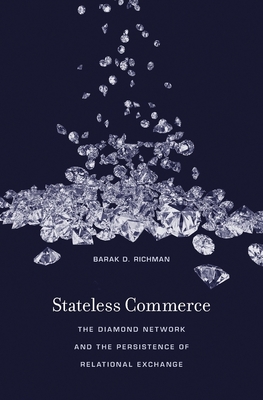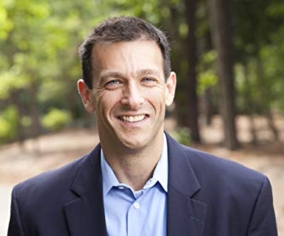
Stateless Commerce:The Diamond Network and the Persistence of Relational Exchange
Interview with Barak D Richman
July 11, 2018Sign Up to listen to full interview.
About Barak D Richman
Barak Richman’s primary research interests include the economics of contracting, new institutional economics, antitrust, and healthcare policy. His work has been published in the Columbia Law Review, the University of Pennsylvania Law Review, Law and Social Inquiry, the New England Journal of Medicine, the Journal of the American Medical Association, and Health Affairs. In 2006, he co-edited with Clark Havighurst a symposium volume of Law and Contemporary Problems entitled "Who Pays? Who Benefits? Distributional Issues in Health Care,” and his book Stateless Commerce was published by Harvard University Press in 2017.
Richman represented the NFL Coaches Association in an amicus curiae brief in American Needle v. The Nat’l Football League, which was argued before the U.S. Supreme Court in January 2010 and again in Brady v. The Nat’l Football League in 2011. His recent work challenging illegal practices by Rabbinical Associations was featured in the New York Times. His work is available at http://ssrn.com/author=334149.
Richman also is on the Health Sector Management faculty at Duke’s Fuqua School of Business and is a Senior Fellow at the Kenan Institute for Ethics. He won Duke Law School's Blueprint Award in 2005 and was named Teacher of the Year in 2010.
Richman has an A.B., magna cum laude, from Brown University, a J.D., magna cum laude, from Harvard Law School, and a PhD from the University of California, Berkeley, where he studied under Nobel Laureate in Economics Oliver Williamson. He served as a law clerk to Judge Bruce M. Selya of the United States Court of Appeals for the First Circuit, and from 1994-1996 he handled international trade legislation as a staff member of the United States Senate Committee on Finance, then chaired by Senator Daniel Patrick Moynihan.
Source: Duke University
Interview Summary
Most industries have evolved from the reliance on ethnic trading networks that once dominated, including grain, cotton and gold marketplaces. However, in the diamond and gem industries these networks continue to dominate and thrive to date.
Once the domain of a handful of Jewish families in Tel Aviv, New York City, Antwerp and London, diamond trading is increasingly challenged by two communities based in Gujarat, India. Palanpuri and Kathiawadi communities have taken the lion share of these industries, and virtually every diamond sold in the U.S. has passed through Surat or Mumbai in India.
In Stateless Commerce, author and professor Barak D. Richman explores how ethnic trading networks function as well as why they still persist in the diamond industry. Professor Richman reviews the evolution of diamond trading networks in the last three decades, offering insights based on field work on three continents. The book sheds light on how these networks fulfil the role that traditional contracts and court system have failed to play when it comes to governance and enforcing the terms of deals.
Key Topics
- What is the value creation process in the diamond industry?
- What are ethnic trading networks and how do they operate?
- How does ethnic trading force governance?
- Why do ethnic trading networks inspire and rely on community-based pressure?
- Why have ethnic trading networks persisted in the diamond trade?
- Why does the diamond industry need so much credit between distributors?
- Are ethnic trading networks lawless, credit pyramids, or stateless global networks?
- What is the reason that stateless commerce based on ethnic trading does not work in other industries?
- How do cartels still dominate the diamond industry?
- How is diamond distribution and trading likely to evolve with the entrance of Palanpuri and Kathiawadi communities from Gujarat, India?
